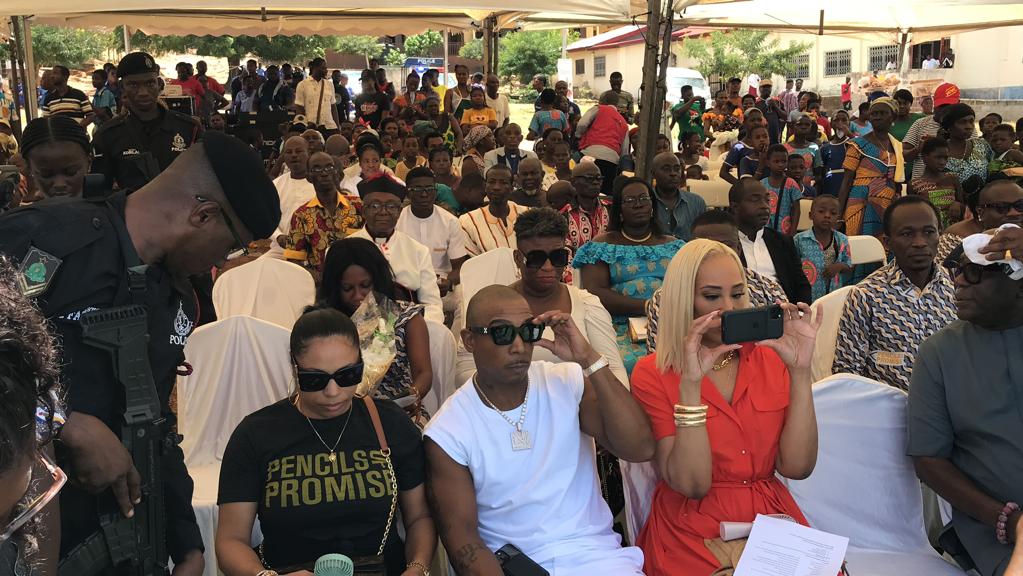
The students being taught how to use the computer
The Friends of Yamoransa and Helping Africa Foundation, both non-profit organisations in the USA, have provided a model 48-seater computer laboratory for the people of Betenase in the Ejura/Sekyedumase municipality of the Ashanti Region.
Dubbed, ‘Yamoransa Model Lab-3 Project’ it is set up to enhance the teaching and learning of Information and Communication Technology (ICT), English, Maths and Science.
The facility also has a four-seater community business centre.
The facilities would be used by over 8,000 school children in Sekyedumase and six other schools in surrounding communities.
The communities are Sekyedumase, Apaaso, Ayinaso, Drobon, Frante and Juaho.
It was established in response to a social media post shared by Mr Richard Akoto Appiah, a teacher of the Betenase M. A. School, exhibiting his teaching efforts in ICT.
Mr Appiah’s social media post, which attracted global attention, showed a detailed drawing of Microsoft Word on a blackboard, which he was using to teach his students.
The scenario exhibited by him indicated his passion for teaching and immense creativity to provide vital knowledge to his students, even with the simple means available to him at the time.
Dr Deborah Rose, the President of Friends of Yamoransa, and Daniel Rose, Founder of Helping Africa Foundation, in response and for their love for computer literacy programmes initiated and coordinated the funding for the project to enhance the teaching and learning of ICT.
Dr Rose, in her address said, the effort of setting up these model labs began with a mandate by the Ministry of Education, Ghana, to educate the young in the emerging fields of ICT, even when the technology itself was not yet widely distributed.
She said in April, a young member of their team alerted her to a viral posting about Mr Appiah, a teacher in Betenase who was using a detailed drawing of Microsoft on blackboard to teach computing.
She said her love for computer literacy touched her heart when she saw the post and that resulted in the setting-up of this model lab and that it was not just about computers, but education in the broadest sense.
“In the United States, our educational philosophy embraces what we call general liberal arts education, encompassing the humanities, the social and natural sciences, rather than strictly technical or pre-professional training. This, we believe, is the best preparation to become citizens of the world,” she said.
Mr Japhet Aryiku, Executive Director of Helping Africa Foundation, said the computer lab would help residents in the area to become proficient in computing and this could help with their job search efforts.
He said the lab would not only benefit students in computing studies, but other subjects especially English, Science, and Mathematics.
“Mr Ayiku said the systems sort to embrace the overall curriculum of Basic Education, covering all the subjects that the children need to learn”.
He said the Betanase Lab was the third in series in three regions namely Yamoransa, Mallam and Betenase in the Central, Greater Accra and Ashanti regions and intends to touch many more communities across the country, adding that, “We are interested in spreading ‘rural computing’ throughout Ghana”.
The Executive Director said many people across the globe have never heard of Betenase, but through Mr Appiah’s social media post on the internet has created opportunities for the entire community socially and economically.
Mr Mohammed Salisu Bamba, Ejura/Sekyedumase Municipal Chief Executive, thanked the Friends of Yamoransa and Helping Africa Foundation for the kind gesture, and TECHAiDE for installing their unique low voltage and robust computing technology, as it will go a long way to benefit the entire municipality and promised to ensure that the facility is used for its intended purpose and properly maintained.
The project is being managed by IMPLEMENTERS, a project management non-profit firm, with its technology partners; TECHAiDE, who have over 10 years experience in technology projects globally.
GNA
Read Full Story




















Facebook
Twitter
Pinterest
Instagram
Google+
YouTube
LinkedIn
RSS